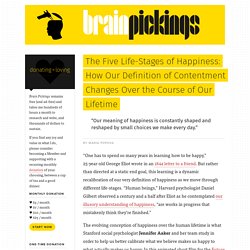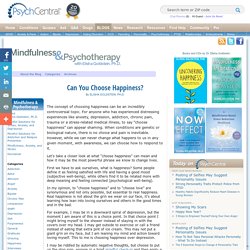

The Five Life-Stages of Happiness: How Our Definition of Contentment Changes Over the Course of Our Lifetime. By Maria Popova “One has to spend so many years in learning how to be happy,” 25-year-old George Eliot wrote in an 1844 letter to a friend.

But rather than directed at a static end goal, this learning is a dynamic recalibration of our very definition of happiness as we move through different life-stages. “Human beings,” Harvard psychologist Daniel Gilbert observed a century and a half after Eliot as he contemplated our illusory understanding of happiness, “are works in progress that mistakenly think they’re finished.”
The evolving conception of happiness over the human lifetime is what Stanford social psychologist Jennifer Aaker and her team study in order to help us better calibrate what we believe makes us happy to what actually makes us happy. Can You Choose Happiness? The concept of choosing happiness can be an incredibly controversial topic.

For anyone who has experienced distressing experiences like anxiety, depression, addiction, chronic pain, trauma or a stress-related medical illness, to say “choose happiness” can appear shaming. When conditions are genetic or biological nature, there is no choice and pain is inevitable. However, while we can never change what happens to us in any given moment, with awareness, we can choose how to respond to it. Let’s take a closer look at what “choose happiness” can mean and how it may be the most powerful phrase we know to change lives. First we have to ask ourselves, what is happiness? In my opinion, to “choose happiness” and to “choose love” are synonymous and not only possible, but essential to real happiness.
For example, I may be in a downward spiral of depression, but the moment I am aware of this is a choice point. Choosing happiness doesn’t mean putting a happy mask on. , The Now Effect. Happiness. Positive Attitude. Happy Thoughts: Here are the things proven to make you happier. Time to round up the research on living a happy life to see what we can use.

First, yeah, a good chunk of happiness is controlled by your genes but there’s a lot you can do to make yourself happier. Many of these techniques have been repeatedly tested and even worked with the clinically depressed. Gratitude, Gratitude, Gratitude I can’t emphasize this one enough. Showing gratitude for the good things you have is the most powerful happiness boosting activity there is.
It will make you happier. It will improve your relationships. It can make you a better person. It can make life better for everyone around you. Bronze medalists are happier than silver medalists. Every night before you go to bed write three good things that happened to you that day. There’s a second lesson here: the reverse is also true. Wanna make yourself and someone else extremely happy?
Do what you are good at as often as you can Think about the best possible version of yourself and move toward that. 10 Simple Habits Proven to Make You Happier. “You are good enough!”

Self-acceptance is a key happy habit, yet it’s one people practise the least. A new survey of 5,000 people has found a strong link between self-acceptance and happiness, despite the fact that it’s a habit not frequently practised. The finding comes from a survey carried out by the charity Action for Happiness, in collaboration with Do Something Different. For their survey, they identified ten everyday habits which science has shown can make people happier. Here are the 10 habits, with the average ratings of survey participants on a scale of 1-10, as to how often they performed each habit: (You’ll notice that the first letters spell out the words GREAT DREAM.)
The survey showed that one of the largest associations between these happy habits and reported happiness was for self-acceptance. This category, though, got the lowest rating for people actually performing the habit, with an average of only 5.56. Follow These 7 Golden Rules for a Happy Life. We won’t solve all your problems by reading a list on the Internet, but it might help anyway.

As I sit here to write this, the first article produced in my new apartment, I look around and reflect on the previous few months of life. Much has changed. Things are crazier, hectic, and in some ways, uprooted. I look around at this beautiful place I’ve become fortunate enough to live in. The music in my headphones is mildly sentimental, and tonight we celebrate a special occasion. 3 Simple Steps to Improve Your Self-Confidence It’s all a bit surreal, actually. To sit and wonder how I’ve handled all of the transitions that have happened in my life recently. While I’ve exceeded personal and professional performance goals as of late, I feel that some time is still well-spent on making sure I remain the person who I’ve worked so hard to become.
For that reason, I write this reminder — both to myself and all of you — of the seven rules I feel every good person should live by. 1.